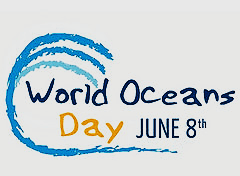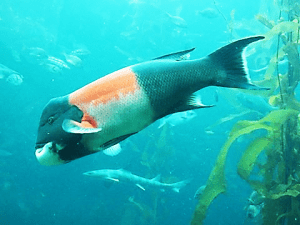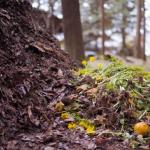 Today is United Nations World Oceans Day. Earth-based spiritual traditions honor the Ocean as the heart and lungs of the planet. The Seventh UU Principle, Respect for the interdependent web of all existence of which we are a part, reflects this. Science confirms the integral role ocean ecosystems play in the survival of the Earth by reminding us that fifty percent of our oxygen comes from the ocean.
Today is United Nations World Oceans Day. Earth-based spiritual traditions honor the Ocean as the heart and lungs of the planet. The Seventh UU Principle, Respect for the interdependent web of all existence of which we are a part, reflects this. Science confirms the integral role ocean ecosystems play in the survival of the Earth by reminding us that fifty percent of our oxygen comes from the ocean.
World Oceans Day is an opportunity to think about our impact on the oceans and to remember the crucial role they play in our lives. This year’s theme for World Oceans Day is healthy oceans, healthy planet.
“The ocean is the heart of our planet. Like your heart pumping blood to every part of your body, the ocean connects people across the Earth, no matter where we live. The ocean regulates the climate, feeds millions of people every year, produces oxygen, is the home to an incredible array of wildlife, provides us with important medicines, and so much more! In order to ensure the health and safety of our communities and future generations, it’s imperative that we take the responsibility to care for the ocean as it cares for us.” (from UN announcement.)

Many earth-based traditions hold the Ocean as sacred. In Santeria, she is Yemaya, one of the two main female deities. Ritual is a key part of expressing our spiritual feelings. All across South and Central America hundreds of thousands gather to send little boats with written petitions offering fruits and flowers, and multicolored paper flags to Yemaya, the Queen of the Ocean. She is an independent deity, not linked to a male god. Her stature reinforces the rights of independence for women. She is seen as nurturing, compassionate and protective.
Appreciation for the status of the ocean has been steadily growing. Thirty years ago there was no World Oceans Day. Until then, too many humans thought: “out of sight, out of mind.” Not anymore. World Oceans Day has been unofficially celebrated every June 8 since its original proposal in 1992 by Canada at the Earth Summit in Rio de Janeiro, Brazil. It was officially recognized by the United Nations in 2008.
This is an essential move forward in the recognition of the importance of the oceans to the survival of those of us who live on land. We are reminded that over two-thirds of the Earth is covered by water (71 percent); 29 percent is land. Less than 1 percent of the Earth’s water is fresh water, and 2-3 percent is contained in glaciers and ice caps.
 Unitarian Universalists have been taking action on behalf of the environment. The UU Ministry for The Earth envisions a world in which reverence, gratitude, and care for the living Earth are central to the lives of all people. This group’s mission is connecting and inspiring an active community of UUs for environmental justice, spiritual renewal, climate action and shared reverence for our Earth home. As UU pagans who belief the Earth is sacred, we have an opportunity to encourage this group to feature more prominently the health of the oceans among the many pressing environmental concerns they address. We know that even if we do not live near the Ocean, She is for Everyone. Educating about the Oceans all across the country and in every congregation can bring remarkable results.
Unitarian Universalists have been taking action on behalf of the environment. The UU Ministry for The Earth envisions a world in which reverence, gratitude, and care for the living Earth are central to the lives of all people. This group’s mission is connecting and inspiring an active community of UUs for environmental justice, spiritual renewal, climate action and shared reverence for our Earth home. As UU pagans who belief the Earth is sacred, we have an opportunity to encourage this group to feature more prominently the health of the oceans among the many pressing environmental concerns they address. We know that even if we do not live near the Ocean, She is for Everyone. Educating about the Oceans all across the country and in every congregation can bring remarkable results.
Simple information can have tremendous spiritual impact and motivate constructive activism. For example, if current use of plastic in packaging continues, by 2050 there will be more plastic than fish in the ocean. One suggestion is to challenge the concept of convenience by reducing the amount of plastic that we use in our daily living. Here are two simple suggestions: don’t use plastic straws, ask for paper instead. Another is to support elimination of plastic shopping bags in retail outlets. Carry your own cloth shopping bags.
At the World Oceans Day Celebration this past weekend at the Monterey Bay Aquarium (MBA) Julie Packard, Founder and Director, noted that ocean conservation was added after land conservation had gained visibility and popularity. By coming to appreciate the oceans, the interconnection of all life has been more accurately and thoroughly understood.

The Monterey Bay Aquarium (MBA) is located in Monterey, California. Founded in 1984, it contains a 28-foot-high, 333,000 gallon tank for viewing California coastal marine life. In this tank, the aquarium was the first in the world to grow live Giant Kelp. Visitors are able to inspect the creatures of the kelp forest at several levels in the building.

Education is the central mission of the Aquarium which primarily focuses on the local marine population. For example, interpretive signs teach that the Sheephead is a unique fish which morphs from female to male during the course of its life. Other postings dispel misconceptions about the shark fostered by trendy films and literature.

Education and engagement of youth are vital goals of the local schools and Aquarium programming. One of the areas they study is the significance of shore birds to the overall healthy interrelationship of Ocean creatures.
After a field trip to remove invasive plants from a bird’s natural habitat one fifth grade student explained, “I realized in the end that it’s not about making the world completely eco-friendly and fixing it all, it’s about doing your part or all you can.”
This year at the MBA World Oceans Day Ceremony, actor Adrian Grenier, founder of the Lonely Whale Foundation, received an award from the Paul Walker Foundation, a group that has worked closely with the Aquarium. The Lonely Whale Foundation is teaching children in Chicago about the ocean. Because the ocean is for everyone they want people who do not necessarily live on the coasts to develop a deep appreciation for the ocean.
Grenier comments: “We have taken a leadership role to deliver curriculum that helps our children develop empathy for marine life and take beneficial actions that create a nurturing environment. This, along with policy change, is a critical complement to affect awareness more quickly.”
Their website contains a wealth of information that can be used by anyone to educate about initiatives that can be taken. http://www.lonelywhale.org/#intro
The environmentalism of celebrities is meant to encourage each of us to speak to our own audiences of friends, family, colleagues and through people oriented media outlets. This is something we as Earth-based Unitarian Universalists can do. The opportunities in our congregations, association and communities and related groups like UU Ministry for Earth are numerous. They can be inventive, life cycle affirming and provide hope. What a satisfying and effective way to put our Earth-based spiritual beliefs to practical use.














